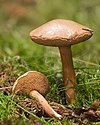Wikipedia:Today's featured article/July 24, 2016
The fungus Chalciporus piperatus, commonly known as the peppery bolete, is a small mushroom of the family Boletaceae found in mixed woodland in Europe and North America, and occasionally in Brazil. It has also become naturalised in Tasmania, under native myrtle beech trees. A small bolete, it has a 1.6–9 cm (0.6–3.5 in) orange-fawn cap with cinnamon or brown pores underneath, and a 4–9.5 cm (1.6–3.7 in) stalk. The rare variety hypochryseus, found only in Europe, has yellow pores and tubes. Described by Pierre Bulliard in 1790 as Boletus piperatus, it is only distantly related to other members of the genus Boletus and was reclassified as Chalciporus piperatus by Frédéric Bataille in 1908. Chalciporus was an early branching lineage in its family and appears to be related to boletes with parasitic properties. Previously thought to be symbiotic with tree roots, C. piperatus is now suspected of being parasitic on the mushroom Amanita muscaria. The flesh of C. piperatus has a very peppery taste, and can be used as a condiment or flavouring. (Full article...)

